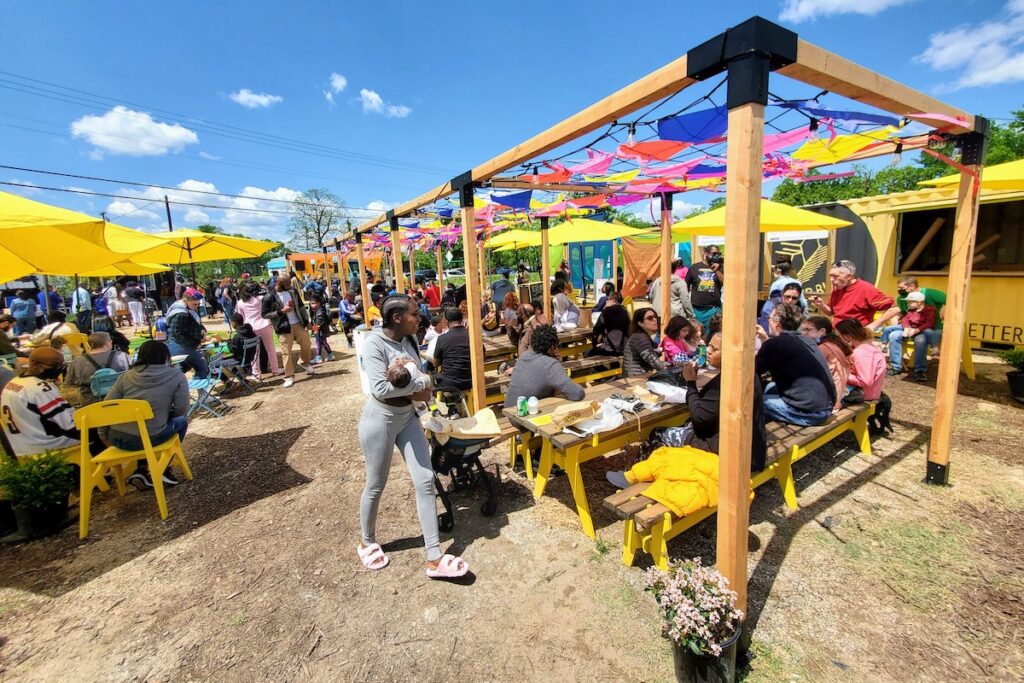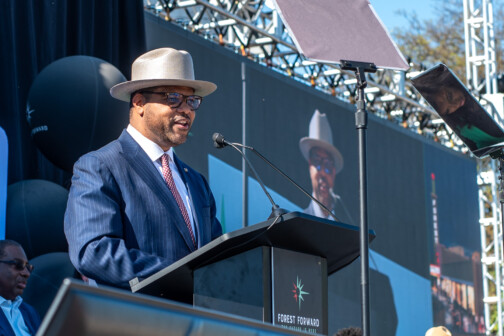Last spring, dozens of people sat on picnic tables under yellow umbrellas and ate from paper boats filled with barbecue and vegan tacos. They drank fresh-squeezed juices and ambled about while looking at work from local artists. The nonprofit Better Block and its partner Do Right by the Streets (DRBTS) had spent a few weeks working with community partners to build a temporary home for a mobile food park in South Dallas, at the corner of Martin Luther King Jr. Boulevard and Holmes Street.
It was packed each day of the four weekends it was open to the public. More than 5,500 people came to the park over the eight days food was sold. Rev. Gerald Davis, who was serving barbecue from his Holy Smoke BBQ trailer, told the Dallas Morning News, “this is what Heaven looks like, no?”
Better Block had an ulterior motive. “Test, analyze, work toward permanency,” read its mission statement for the effort. “During this time, we’ll be able to gather data and feedback to inform any long-term changes, plans, and designs.” It was armed with a $65,000 grant from The Real Estate Council, which it used to cover the cost of putting the event together and offsetting the fees the city requires from these small operators before they can sell their food.
In many ways, the challenges for mobile food vendors in Dallas rose to the surface with these vibrant weekends in South Dallas. City regulations make it difficult for these entrepreneurs to operate. There are permitting hoops and hundreds of dollars of fees, which puts these operators in a financial rut before they serve their first taco. Some food, like raw poultry and seafood, must be cooked off-site and transferred to the point of sale, adding another headache for vendors who are looking to serve healthier options.
Operators say the city’s rules are preventing mobile vendors from creating the vibrant food truck and trailer scene found in a city like Austin.
“You have to pay a commercial kitchen to cook food on top of paying the city to get a permit. You could literally be $300-plus in a hole before you have even served your first plate,” said Shanay Wise, owner and CEO of Dallas-based Catering Done Wisely. “You could be over $300 out hoping and praying you will make three times that, but you can’t be guaranteed that. At the end of the day, it’s fair to ask yourself if you even made a profit.”
Food trucks cost around $100,000 each. Trailers are significantly cheaper, selling for between $20,000 and $30,000. (The city defines the latter as an enclosed space with wheels that can be hauled off by a vehicle.) Food truck vendors pay a fee once a year. Trailers have to pay every time they want to serve during an event.
“I hope and pray that the city of Dallas can find something that we can live with and afford. A lot of people can’t afford a food truck. A lot of people can’t afford a storefront right now,” Wise said. “Vending is what is helping people through this time.”
Better Block took what it learned and launched a task force, which included the nonprofit’s Executive Director Krista Nightengale, former Councilwoman Angela Hunt, and five other stakeholders. The group proposed recommendations to the City Council’s Quality of Life Committee on January 26.
The task force made four recommendations and proposed a pilot. The pilot designates free vending sites for mobile food units that operate on a first-come, first-serve basis. These sites do not require the operator to get a permit or pay usage fees before they can serve. The pilot is already in the works at Pacific Plaza in downtown as well as Kiest Park in Oak Cliff, according to Mayor Pro Tem Chad West, the councilman representing North Oak Cliff’s District 1. Other locations, like the Bath House Cultural Center near White Rock Lake, are under consideration.
“The big takeaway is that we want to increase opportunity for diversity among entrepreneurs by reducing barriers for small-business owners as well as expand the Dallas food scene to be more robust,” Nightengale said.
Better Block wants the city to change how vendors are defined in the ordinance. “Mobile Food Preparation Vehicle” and “Motorized Mobile Food Establishment” are the current definitions of trailers and trucks. Each come with different fees and requirements. Better Block is recommending using a single term of “Mobile Food Unit,” which would apply the same regulations to trucks and trailers.
Although altering a few words seems like a small action, it could have a major impact. By revising the description of mobile food units, it allows food trailers to receive a year-long permit instead of paying for city permits ahead of every event they choose to participate in.
“This ordinance and the way it’s written really makes it hard for the little guy who is just getting started and who wants to be an entrepreneur because they’re constantly having to fill out paperwork and pay fees,” West said.
Better Block is also asking the city to allow vendors to cook raw poultry and seafood by eliminating the “fast-cooked food” requirement. Currently, mobile chefs are limited to cooking only poultry or seafood that is “frozen and breaded and goes directly from the freezer into a fryer.”
Better Block is also recommending the city loosen the requirement that truck and trailer operators visit a commissary—a commercial kitchen in a permanent structure—from once a day to once a week.
West said Better Block has spent about a year raising this issue, but Council couldn’t look away after the success of the event in South Dallas. State stakeholders, like the Texas Restaurant Association, are also on board with making it easier for trucks and trailers to operate while upholding sanitary standards.
“Mobile food vendors like food trucks are an important and evolving segment of the foodservice industry, especially in growing cities like Dallas. Regulations governing them should prioritize food safety while encouraging innovation,” said Kelsey Erickson Streufert, chief public affairs officer for the Texas Restaurant Association.
Cities like Austin and Seattle employ similar mobile food vendor codes that Better Block is proposing. (The barbecue truck Distant Relatives was even nominated for a James Beard award this year.)
The Dallas City Council Quality of Life Committee will meet later this month to consider new mobile food vendor restrictions. It will then head to the full council for a briefing and a vote later this year.
“Staff has had a lot of time to work on this and work through it,” West said. “I think it’s time we get this ordinance out there and level the playing field for everybody.”





